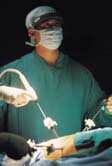 Esophageal cancer: tough to treat, easier to prevent Each year more than 12,000 Americans are diagnosed with cancer of the esophagus, the hollow tube that connects the throat with the stomach. Most - about 90 percent - will eventually die from it. Risk factors include some of the usual suspects - smoking, excessive drinking - and one factor that might be surprising: Heartburn. Chronic heartburn, often dismissed as a minor annoyance handled with a roll of antacids, is a symptom of a condition known as gastroesophageal reflux disease (GERD), in which stomach acid spills backwards up into the esophagus. The constant drip of stomach acid and the resulting cycle of injury and healing can cause red erosions (like scrapes of the skin) to develop on the normally whitish lining of the esophagus. In about 10 percent of cases of long-term reflux, the esophagus develops a new salmon-colored lining that resembles the lining of the stomach. This precancerous condition is called Barrett's esophagus. One or two percent of these people are likely to develop esophageal cancer. "Barrett's esophagus is a warning sign of cancer," says Dr. Derick Lau, an assistant professor of hematology/oncology at the UC Davis Medical Center. "The incidence of adenocarcinoma of the esophagus is on the rise. We think it's related to reflux, although we're still not sure." Only about 10 percent of people diagnosed with esophageal cancer survive more than five years. Like many cancers, esophageal cancer has few warning signs until it's advanced. "Usually patients come to my office because they cannot swallow," says Lau, a medical oncologist who is part of the esophageal cancer team at UC Davis. "By that time, it has spread to the lymph nodes." To improve treatment outcomes, UC Davis physicians recommend a regimen of chemotherapy and radiation prior to surgery to patients with esophageal cancer. This helps shrink the tumor and minimizes the chance that an errant cell will escape the knife. "We think chemotherapy and radiation with surgery is better than surgery alone. It's not the standard treatment but we'd like to make it standard," says Lau. "We're conducting a study to see if this new regimen improves survival rates." In the meantime, Lau offers the following guidelines to avoid esophageal cancer:
Home |
Table of Contents |
To our Readers |
Building on Basics UC Davis Health System | © 2000, 2001, 2002 UC Regents. All rights reserved. |
 |
